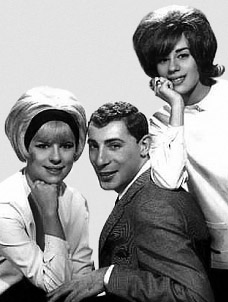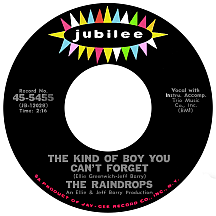THE RAINDROPS
The Kind of Boy You Can't Forget
Singer-songwriters Ellie Greenwich and Jeff Barry had diverse careers in the music business, separately and together, before, during and after their marriage, which turned out to be more of a pleasant, temporary diversion than a priority. Any passion for each other was overshadowed by a love of music each had since childhood. A two-year stint as The Raindrops wasn't their most successful project, but it was a lot of fun (and unusual as far as recording application), in addition to being tied in with their greatest songwriting triumphs, some of them concurrent with the trio-that-was-really-a-duo's brief heyday.
Both were born in Brooklyn. Jeff in 1938; his family relocated to Plainfield, New Jersey. Ellie in 1940; her family moved to Levittown, Long Island. Jeff listened to a lot of country music during childhood. Ellie took dance lessons and learned to play the accordion. He joined the Army after graduation. She formed a girl group, The Jivettes, with two high school friends. He got married. She went to college and lugged her accordion to auditions with various New York song publishers. In 1958, Ellie recorded a song she'd written about a current dance craze, "Cha-Cha Charming," for RCA Victor. Jeff made his first record the following year for the same label; the spoken-and-sung novelty tune "It's Called Rock and Roll" was produced by Hugo and Luigi.
The label connection led to Jeff being invited to Ellie's aunt's house for Thanksgiving dinner. His wife tagged along, of course. Several months later, he was divorced and dating Ellie. Jeff had already scored a couple of chart hits as a songwriter: "Teenage Sonata" by Sam Cooke and, with Ben Raleigh, "Tell Laura I Lover Her," a notorious "death song" by Ray Peterson in the U.S. and Ricky Valance in the U.K. He also made several more records of his own for RCA and Decca and one, "You Know I Do," for the Jubliee label, owned by former bandleader Jerry Blaine; none got anywhere close to being a hit. Jeff and Ellie began working in the Brill Building, Manhattan's ground zero for pop music creativity. She began cutting demonstration discs, two of which were released without further enhancement: "Red Corvette" on Madison, credited to Ellie Gee and the Jets, and "Big Honky Baby" on RCA as Kellie Douglas. She got encouragement from fellow Brill songwriter Carole King, who'd started the same way and found success in a relatively short period of time.
Jeff penned two more big ones, "Tell Me What He Said," a huge hit in Britain for Helen Shapiro, and "Chip Chip," top ten in the U.S. for Gene McDaniels. In October 1962, Barry and Greenwich were married. Tony Powers became Ellie's "daytime hubby," as they penned "He's Got the Power" for The Exciters and began cranking out hits for Phil Spector's stable of stars, Bob B. Soxx and the Blue Jeans ("Why Do Lovers Break Each Other's Heart?"), The Crystals ("Da Doo Ron Ron") and Darlene Love ("(Today I Met) The Boy I'm Gonna Marry"). Then Jeff pushed Powers aside (and his regular collaborator Artie Resnick as well), when he and Ellie decided to write together exclusively.
"What a Guy" was written with The Sensations (of "Let Me In" fame) in mind. But the demo came out so good they wanted to release it and Blaine was game to sign them to Jubilee as a group; a solo Ellie demo ("It's So Wonderful") was chosen for the flip. The name was inspired by Dee Clark's great '61 hit "Raindrops," despite the existence of no less than four earlier Raindrops groups including Dootone's Cuff Links, who used the name for awhile. Plug side "What a Guy" landed mid-chart (just missing the top 40) in June 1963. Next, another Greenwich-Barry song went even higher: "The Kind of Boy You Can't Forget" offered an overabundance of 'diddle-iddle-iddle-it's and some well-timed 'wo-wo-wo-wo-wo's and came on strong at radio throughout America, making it to the top 20 in September. Isn't young romance thrilling?
During this time, Jeff and Ellie gained insider status with Phil Spector, whose operation had moved from New York to Hollywood, California. They kept busy creating songs that included top ten smashes for the Crystals ("Then He Kissed Me") and The Ronettes ("Be My Baby"), usually sharing songwriter credit with Phil, a frustrating part of the deal, though it was better than having no deal at all. They also supplied material for The Chiffons in N.Y., but the pressure to release new Raindrops' singles had to be fulfilled and in most cases were demos by Ellie with Jeff's backing vocals and 'bow-dip's dubbed in while some were just the demos sans Jeff. The cover of their album revealed a third member, Ellie's younger sister Laura Greenwich, but she never sang on the actual records, though she was present for a few promotional appearances, strictly lip-synced affairs by the sisters, Beverly Warren, and Bobby Bosco aping Jeff's parts.
The third single, "That Boy John," didn't fare particularly well. It was issued in November, a few weeks before the assassination of President John F. Kennedy, which has been cited as a reason for its failure, though quite a few stations were still playing it as late as January '64. Then they tried something different, remaking "Book of Love" (a hit from '58 by The Monotones), and reached a mid-chart peak in April. At that point they were doing better as songwriters, especially with Spector-produced songs, though one slipped through Phil's fingers. "Chapel of Love," previously recorded separately by Darlene Love and the Ronettes, went all the way to number one by new act The Dixie Cups as the inaugural release on Jerry Leiber and Mike Stoller's Red Bird label (Phil was miffed, but still got one-third of the writer credit). The Cups scored again with B&G's "People Say," as did The Jelly Beans with "I Wanna Love Him So Bad"...and Jeff and Ellie didn't have to share credit with anyone at Red Bird!

After the Exciters floundered with Jeff and Ellie's "Do Wah Diddy," British band Manfred Mann covered it, added an extra "Diddy" to the title, and soared to number one in England and America. The Raindrops' final chart single, "One More Tear," barely made a showing around that time, but another major success was on the horizon. Ellie had known "Shadow" Morton since he'd sung backing vocals for her in the "Cha-Cha Charming" days and she helped him get a meeting with Leiber and Stoller. After lending a hand to the production of The Shangri-Las' fabulous first hit, "Remember (Walking in the Sand)," she and Jeff co-wrote several songs for the two pairs of sisters including "Leader of the Pack," which shook the music biz for a few weeks, reaching number one in November. Jeff and Ellie were on a roll; it was the couple's third chart-topper that year.
One of Ellie's solo recordings, "I Don't Want to Be Your Baby Anymore," was released, like the Raindrops, under a faux-girl group name, The Popsicles. Old habits die hard! While her solo efforts usually didn't go far, she can be heard doing prominent backing vocals on recordings by major artists like Lesley Gore (for whom she and Jeff wrote two hits) and Dusty Springfield. Two Raindrops 45s (including a remake of Roy Hamilton's hit "Don't Let Go," penned by Jesse Stone) came out in early 1965, then the project ended. The Raindrops never returned, except on oldies stations. By this time, marriage had turned to divorce. Ellie was devastated, but Jeff would be staging his third wedding within months. Yet they had another number one single after-the-fact, a song from the Raindrops' repertoire covered by Tommy James and the Shondells. "Hanky Panky," recorded three years earlier, hit the top in July 1966.
They began working with Neil Diamond after Ellie had done demos of a couple of his songs, producing his entire output in '66 and '67 (you don't have to be married to do that!) for Bert Berns' Bang Records. Then it was back to Spectorland and one of their greatest songwriting achievements recorded by Ike and Tina Turner; "River Deep - Mountain High" has since become a classic. But there were things that put a damper on the proceedings besides the dissolution of the Raindrops and the implosion of their marriage. By the end of 1967, Leiber and Stoller shuttered Red Bird. Phil Spector closed the doors on Philles Records. And Berns died, leaving the fate of Bang Records uncertain.
Jeff bounced back quickest, getting involved with creating songs for late-'66 phenomenon The Monkees. Ellie had less luck, but one notable event came in the spring of '67: she finally scored a solo chart single with "I Want You to Be My Baby," a highly energetic song composed by Jon Hendricks with popular mid-'50s versions by Louis Jordan, Georgia Gibbs and trombone-playing bombshell Lillian Briggs. The live-party atmosphere evoked by backing singers on Greenwich's version had been used previously on James and Bobby Purify's hit "Shake a Tail Feather," which Ellie also participated in.
There are many other accolades the former married couple can be credited with. Jeff founded Steed Records in 1967, notable for a string of hits by Andy Kim, part of another hot project, The Archies, who (similar to the Raindrops) lived a virtual existence, in this case because they were cartoon characters (don't tell Ron Dante or Toni Wine I said that, no doubt they will defend their realness). Jeff's legend lengthened with hit songs by Robin McNamara, Bobby Bloom, The Staple Singers, Nino Tempo and Olivia Newton-John and popular TV themes (The Jeffersons, One Day at a Time). Ellie made records for Bell and Verve (doing updated versions of a few of her famous songs in 1973) and continued doing demos (her favorite pastime). She supplied backing vocals for Bette Midler, Blondie, Cyndi Lauper and other stars in studio sessions. In 1984, she played a key part in writing a Broadway musical, Leader of the Pack, based on her life. Bob Crewe produced the original cast album. Both Ellie and fellow session vocalist Darlene Love appeared in the show.
To sum it up, you could could say the lives of these Brooklyn-born ex-spouses with lifelong music/lyric/singing obsessions came in contact with so many great artists. But I think it was the other way around. Everyone in the music business, and the fans, are lucky to have lived on the same planet with the brilliant, hard-working Ellie Greenwich and Jeff Barry.


